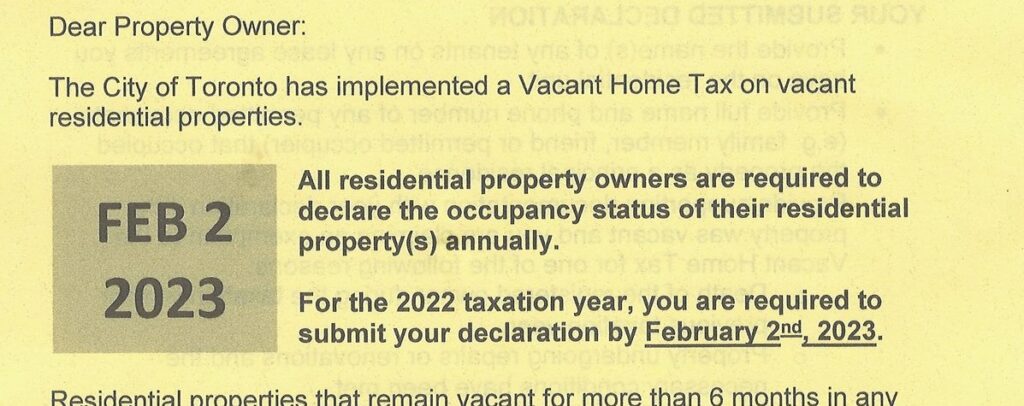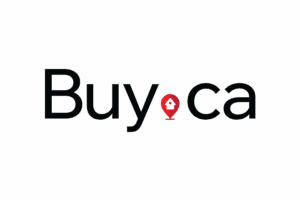Here’s how Toronto’s new vacant home tax works
Toronto has just introduced its new vacant home tax in 2023 and if you’re a homeowner you probably want to brush up on what this means for you.
We asked our mortgage expert Robert Malcolm to give us the rundown on the new tax and how it will impact Toronto homeowners and investors.
What is the Toronto Vacant Home Tax?
By now, every owner of a residential property in Toronto has received a YELLOW Notice from the City of Toronto regarding the Vacant Home Tax (“VHT”). Included in this notice are the details of the tax as well as the immediate actions you need to take if the tax applies to you.
In short the Vacant Home Tax is a tax on all homes that are not occupied by owners or tenants to encourage property owners to rent vacant homes.

Why is Toronto imposing a Vacant Home Tax in 2023?
The Vacant Home Tax is a policy tool to address the lack of rental housing in the City. The main goal of the Vacant Home Tax is to increase housing availability by reducing the number of residential properties that are left vacant. Data has estimated that Toronto had as many as 130,000 vacant homes in 2021 and with the population rapidly growing in the GTA the demand for housing is always on the rise and supply of housing hasn’t been able to keep up. The average rental price in Toronto was up over 30% in 2022 outpacing inflation despite the cooling housing market amid rising interest rates.
The goal to encourage owners of vacant properties to rent them by taxing homes left uninhabited is meant to increase the rental supply which will have downward pressure on the price. In theory, according to the laws of supply and demand, the greater the number of available homes for rent, the lower the price should be. That doesn’t necessarily mean rental prices will drastically drop in 2023, but it should have a positive impact on rental affordability at least in the short term.
What constitutes a vacant home in Toronto?
According to the City of Toronto By-law 97-2022: “A Residential Unit is a Vacant Unit if for more than six months during the Taxation Year, no Self-Contained units comprising the Residential Unit are either:
- The Principal Residence of the Owner or another Occupant; or
- occupied for residential purposes by one or more Tenants in aggregate for at least six months of the year.”
In other words, vacant units are homes that aren’t principal residences and are left unoccupied for 6 months or more in a year. If you have a condo that’s left unoccupied for 6 months, that’s a vacant home and you will be subject to the VHT.
If you’re a homeowner you won’t have to pay the Vacant Home Tax if your home is:
1. Someone’s Principal Residence, and remember you can only have one Principal Residence. The home can be occupied by the owner or any other person, without the need for a lease, as long as it is that person’s Principal Residence;
Or
2. Occupied by a Tenant (or Tenants) – not necessarily as their Principal Residence, but for residential purposes. A Tenant is defined as someone living there according to a written lease or sublease, for a consecutive term of at least 30 days. One or more tenants must occupy the property for at least six months in the year.
If you’re wondering whether those six months have to be consecutive, the answer is no, they are cumulative so you could theoretically rent to 4 different tenants for 3 months each and still avoid the VHT.
How much is the Vacant Home Tax?
The Vacant Home Tax is 1% of the property’s Current Value Assessment (CVA). For example, if the CVA of your property is $1 million, the tax would be $10,000 (1% x $1,000,000) per year. The Vacant Home Tax is in addition to the property taxes already levied on the property. This is a yearly tax.
When does the Vacant Home Tax take effect?
The Vacant Home Tax officially comes into effect in 2023, which is now, and it is based on your properties vacancy status in 2022.
When is the filing deadline for the Vacant Home Tax?
The filing deadline for the Vacant Home Tax is February 2, 2023. If you own a property which was vacant for 6 months or more in 2022, you are required to report this to the city by February 2nd. All property owners are required to make a declaration with the city regarding their property’s vacancy status.
When is the Vacant Home Tax payable?
Owners of properties subject to the Vacant Home Tax will be issued a Notice in March/April and payment will be due on May 1, 2023.
What happens if I don’t file a declaration?
All homeowners are required to file a declaration with the city stating their home’s vacancy status by February 2nd, even if you are the principal resident of your home.
If you do not file a declaration, your property will be deemed to be vacant and you will be billed for the Vacant Home Tax. In addition, failing to declare or making false statements may be subject to fines of $250 to $10,000. The late filing of a declaration is subject to a fine of $250. Interest applies on overdue payments at a rate of 1.25% on the first day of default and on the first day of each month thereafter, for as long as taxes or charges remain unpaid.
Are there any exemptions from the Vacant Home Tax?
Yes. There are very specific exemptions as set out by the City. A property may be left vacant and be exempt from the Vacant Home Tax if one of the following criteria is met, with the supporting documents, as listed on the City of Toronto website:
- Death of a registered owner: The property was vacant for six months or more in the previous year due to the death of an owner. Supporting documentation such as a copy of the death certificate must be provided.
- Repairs or renovations: The vacant property is undergoing repairs or renovations, and all the following conditions have been met:
The repairs and renovations prevent occupation and normal use of the vacant property; All necessary permits have been issued for the repairs and renovations; The City’s Chief Building Official is of the opinion that the repairs or renovations are being actively carried out without unnecessary delay. You must provide supporting documentation including a description of the type of project preventing occupancy and a copy of building permits issued related to the repairs and renovations.
- Principal resident is in care: The principal resident of the vacant property is in a hospital, long-term, or supportive care facility for up to six months during the taxation year. This exemption may be claimed for up to two consecutive taxation years. Supporting Documentation such as a signed letter from a health care facility on letterhead is required.
- Transfer of legal ownership: You purchased your property in the previous year, and the sale involved a 100% transfer of an interest in the property to an unrelated individual or corporation. This excludes name changes, adding a second owner, and removing a second owner. Supporting Documentation such as a copy of land transfer deed is required.
- Occupancy for full-time employment: The vacant property is required for occupation for employment purposes for a total of at least six months in the taxation year, by its owner, who has a principal residence outside of the Greater Toronto Area. Supporting Documentation such as proof of residency outside the Greater Toronto Area is required.
- Signed letter from employer on company letterhead or employment contract.
- Court order: There is a court order in force that prohibits occupancy of the vacant property for at least six months of the taxation year. Supporting Documentation such as a copy of court order is required.
How is the City verifying the declarations?
The City will be conducting random or specific audits whereby it will require the owner to provide the supporting documentation for its declaration.
For more information, go to the City’s website at: https://www.toronto.ca/services-payments/property-taxes-utilities/vacant-home-tax/
For more homeowner insights and personalized tools to help you make the right real estate decisions, sign-up for Perch and gain access to our free tools.
 Robert
Robert





